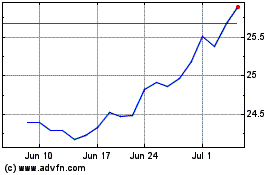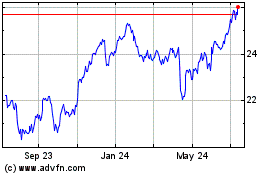Challenge to the Sprint, T-Mobile deal precedes antitrust ruling
by the Justice Department
By Drew FitzGerald and Brent Kendall
This article is being republished as part of our daily
reproduction of WSJ.com articles that also appeared in the U.S.
print edition of The Wall Street Journal (June 12, 2019).
A group of state attorneys general filed a lawsuit on Tuesday to
block the proposed merger of T-Mobile US Inc. and Sprint Corp., a
highly unusual challenge that comes as federal antitrust officials
are still reviewing the more than $26 billion deal.
The suit alleges that the union of the third- and fourth-largest
wireless carriers in the U.S. would drive up prices for cellphone
services. It was filed in a federal court in New York and was led
by the attorneys general of New York and California.
The proposed merger would result in lost jobs, price increases
and less improvement in services, New York Attorney General Letitia
James said at a news conference. "The deal is bad for consumers,
it's bad for innovation, it's bad for workers," she said.
Shares of Sprint fell 6%, while T-Mobile slipped 1.6% Tuesday.
Officials for the two companies didn't respond to requests for
comment.
The agreement T-Mobile struck with Sprint in April 2018 was the
culmination of years of on-again, off-again talks between the
rivals, which are seeking economies of scale in a mature U.S.
wireless market dominated by Verizon Communications Inc. and
AT&T Inc. The smaller companies have tried more than once to
strike a deal, only to founder on terms or fears that the Justice
Department would object to their merging.
Tuesday's pre-emptive attack by the states comes as their
federal counterparts at the U.S. Department of Justice, which must
also pass judgment on the transaction, continue to review the
wireless merger.
"There's no rule or regulation that says we have to wait for
DOJ," Ms. James said.
The states didn't give the Justice Department advance notice
before filing their lawsuit, according to people familiar with the
matter.
News of the state-led complaint broke as high-level company
representatives continued discussions on the merger with Justice
Department lawyers on Tuesday, according to people familiar with
the talks.
Although the Justice Department and Federal Trade Commission are
the principal merger authorities, state attorneys general have the
authority to challenge acquisitions under antitrust laws. But they
usually do so only in partnership with federal counterparts. When a
state has gone it alone, it has typically been to challenge a deal
with deep local connections, such as a hospital-industry
merger.
Wayne State University law professor Stephen Calkins said he
couldn't recall state attorneys general ever challenging a merger
of this size and prominence on their own, adding it was even more
unusual for the states to act while the Justice Department review
was pending.
"It's really quite remarkable," Mr. Calkins said.
Attorneys general from Colorado, the District of Columbia,
Maryland, Michigan, Mississippi, Connecticut, Virginia and
Wisconsin joined the lawsuit filed Tuesday. The state and District
of Columbia officials are all Democrats.
If the wireless firms win formal approval from federal
regulators, including the Federal Communications Commission, they
could proceed to close their merger without waiting on the states'
litigation -- unless a federal judge blocks them from doing so.
Xavier Becerra, California's attorney general, said the states
would seek a preliminary injunction to keep the companies
separate.
The litigation could create months of legal uncertainty for the
deal's prospects.
The companies got a leg up last month when FCC Chairman Ajit
Pai, a Republican, unilaterally threw his support behind the deal
in exchange for their commitment to invest in 5G infrastructure
covering rural areas. The companies also promised to shed Sprint's
Boost Mobile prepaid cellphone service.
The Justice Department has yet to publicly comment on those
concessions, though The Wall Street Journal previously reported
that department officials believed the FCC package wasn't enough to
protect competition in the wireless industry.
A Justice Department spokesman declined to comment.
Mr. Becerra said Mr. Pai's actions at the FCC were one of the
triggers for the states' decision to move forward. State officials
had substantive conversations with their Justice Department
counterparts, though "they don't tell us what to do" and "we don't
tell them what to do," Mr. Becerra said.
The Obama-era Justice Department made clear that further
wireless consolidation was a non-starter. But T-Mobile and Sprint
executives last year decided to make their case to the Trump
administration, saying that without a merger they risked falling
behind Verizon and AT&T as the industry upgrades to 5G
networks. Combining the smaller companies would arm them with a
swath of wireless-spectrum licenses considered ideal for 5G, they
said.
Sprint is controlled by Japan's SoftBank Group Corp., whose
chairman, Masayoshi Son, has long sought to combine the U.S.
wireless company with T-Mobile, whose largest shareholder is
Deutsche Telekom AG. Sprint has been struggling to hold on to
customers, while T-Mobile has been gaining market share.
The recent flurry of regulatory developments has worked to box
in Justice Department antitrust chief Makan Delrahim on both his
left and his right. While the states' lawsuit could put heat on Mr.
Delrahim's antitrust division to file its own challenge, the
department's review has been complicated by the pronouncement by
the FCC's Republican majority that the merger is in the public's
interest.
The Justice Department has never litigated a challenge against a
merger that the FCC has found to be good for consumers, so any such
court case could place the department in uncharted waters.
Wireless operators have tried different combinations to shrink
the number of national U.S. players down to three, but so far they
have all been foiled. In 2011, the Justice Department and FCC
opposed AT&T's plan to buy T-Mobile, warning the merger would
"significantly diminish competition."
--Corinne Ramey contributed to this article.
Write to Drew FitzGerald at andrew.fitzgerald@wsj.com and Brent
Kendall at brent.kendall@wsj.com
(END) Dow Jones Newswires
June 12, 2019 02:47 ET (06:47 GMT)
Copyright (c) 2019 Dow Jones & Company, Inc.
Deutsche Telekom (QX) (USOTC:DTEGY)
Historical Stock Chart
From Mar 2024 to Apr 2024

Deutsche Telekom (QX) (USOTC:DTEGY)
Historical Stock Chart
From Apr 2023 to Apr 2024
